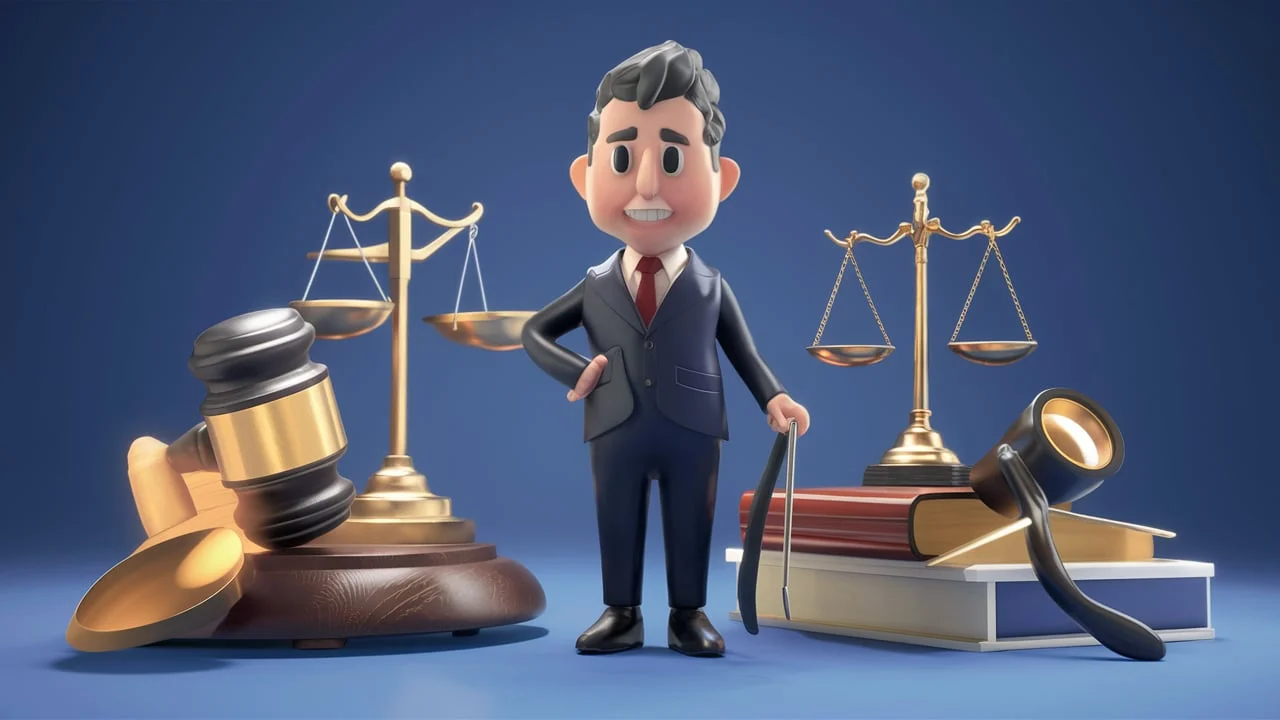Lawyers have long fascinated people with their unique roles, historical importance, and sometimes peculiar customs. From odd laws to humorous anecdotes, the legal world is full of quirks. Here are 103 quirky facts about lawyers that will give you a glimpse into the intriguing and often amusing side of the legal profession.
1. ⚖️ Ancient Beginnings: The Early Days of Law
- Lawyers date back to ancient Greece and Rome, where orators would argue cases for their clients.
- The first known lawyer was Hammurabi, the Babylonian king who wrote the first set of laws.
- Ancient Egyptian lawyers often served as scribes, recording legal transactions and agreements.
- In ancient Greece, lawyers were not formally trained but were often philosophers or statesmen.
- Roman lawyers called “jurisconsults” advised citizens on the law for free.
- Roman Emperor Claudius legalized the practice of charging fees for legal services.
- The Code of Hammurabi is one of the oldest deciphered writings of significant length in the world.
- Socrates famously defended himself in court, choosing to use his own philosophical arguments.
- Early Chinese legal codes also involved a legal profession, with lawyers playing roles in mediation.
- In medieval Europe, clergy members often served as lawyers due to their literacy.
2. 📜 Medieval and Renaissance Legal Oddities
- Trial by combat was a method of legal dispute resolution during the medieval period.
- Animal trials were held in medieval Europe, where animals could be prosecuted for crimes.
- In 1510, a French court tried a pig for murder, and it was sentenced to be hanged.
- Lawyers in medieval England wore wigs as a sign of their profession, a tradition that continues today.
- The Magna Carta, signed in 1215, laid the groundwork for modern legal systems.
- Renaissance Italy saw the rise of the notary, a crucial legal profession for authenticating documents.
- The first law school in Europe was established in Bologna, Italy, in the 11th century.
- In the Middle Ages, law was heavily influenced by the Church, with canon law playing a significant role.
- Medieval lawyers often acted as both legal advisors and judges.
- Court jesters could be summoned to provide comedic relief during trials in medieval courts.
3. 🎩 Unusual Legal Practices in History
- In ancient Rome, a legal expert could be fined for giving incorrect advice.
- In medieval France, a convicted criminal could escape execution by becoming an executioner.
- In 18th-century England, defendants could claim “benefit of clergy” to receive a lighter sentence.
- Ordeal by water was a legal practice where accused individuals were thrown into water to determine guilt.
- In ancient Ireland, Brehon law allowed for “honor price” compensation instead of physical punishment.
- In 19th-century Britain, transportation to penal colonies was a common punishment for convicts.
- Ancient Hindu law included the concept of Dharma, a duty-bound ethical code.
- Trial by ordeal included tasks like carrying hot iron to prove innocence.
- The “Hue and Cry” system in medieval England required citizens to pursue criminals actively.
- Legal oaths in ancient times often involved invoking deities or sacred objects.
4. 🧑⚖️ Famous Historical Lawyers
- Abraham Lincoln was a self-taught lawyer before becoming the 16th President of the United States.
- Mahatma Gandhi trained as a lawyer in London before leading India’s independence movement.
- Nelson Mandela was a lawyer who fought against apartheid in South Africa.
- Thurgood Marshall was the first African American Supreme Court Justice and a civil rights lawyer.
- Clarence Darrow was a famous American lawyer known for his defense in the Scopes Monkey Trial.
- Sandra Day O’Connor was the first woman appointed to the U.S. Supreme Court.
- Ruth Bader Ginsburg was a champion for gender equality and served on the U.S. Supreme Court.
- Johnnie Cochran gained fame for his defense in the O.J. Simpson trial.
- Robert Kennedy served as U.S. Attorney General and was a prominent advocate for civil rights.
- F. Lee Bailey was known for his involvement in high-profile cases like the O.J. Simpson trial.
5. 🏛️ Peculiar Court Cases
- The McDonald’s hot coffee case led to significant changes in corporate liability and consumer protection.
- A court in New Zealand once ruled in favor of a man who sued for being “overworked and underpaid.”
- A woman in Israel successfully sued a television station for “ruining her life” by airing false news.
- In the U.S., a man sued himself and won, collecting his insurance payout.
- A court in India heard a case involving a lawsuit against a Hindu deity for encroachment.
- A New York man sued the state for creating “traffic jams,” claiming it caused him stress.
- The “Spilled Coffee Lawsuit” highlighted the importance of product warnings and consumer safety.
- A woman in China sued her husband for “being ugly,” claiming he misled her about his looks.
- A judge in Italy ruled that a couple’s parrot should be allowed to testify in a theft case.
- A U.S. prisoner once sued for being served a “peanut butter and jelly sandwich” repeatedly, claiming cruel and unusual punishment.
6. 🤖 Technology and the Law
- Artificial intelligence is increasingly being used to review legal documents and predict case outcomes.
- Blockchain technology is being explored for secure and transparent legal transactions.
- E-discovery involves the use of technology to gather and present electronic evidence in court.
- Online dispute resolution allows parties to settle legal disputes via the internet.
- Virtual law firms are emerging, providing legal services through online platforms.
- Legal research tools like Westlaw and LexisNexis use AI to assist lawyers in finding relevant cases.
- Cybersecurity laws are evolving to address the increasing threat of cybercrime.
- Digital signatures are legally recognized in many jurisdictions for authenticating documents.
- Teleconferencing technology is now widely used for court hearings and legal consultations.
- Social media evidence is becoming more prevalent in court cases, with posts and messages used as evidence.
7. 🌍 International Legal Oddities
- In Singapore, chewing gum is illegal and subject to strict penalties.
- In Italy, a judge ruled that a man could not be convicted of a crime if he slept through it.
- In Canada, it’s illegal to pay for items with too many coins.
- In Germany, it is illegal to run out of fuel on the Autobahn.
- In France, it is illegal to name a pig “Napoleon.”
- In Japan, there are strict laws regulating the use of drones in urban areas.
- In Switzerland, it is illegal to keep just one guinea pig, as they must be kept in pairs.
- In Australia, it is illegal to disrupt a wedding or funeral.
- In the UK, it is illegal to handle a salmon suspiciously.
- In South Korea, online gaming after midnight is banned for young people under 16.
8. 🥸 Strange Legal Defenses
- The “Twinkie Defense” was used in the trial of Dan White, who claimed junk food led to diminished capacity.
- The “Matrix Defense” was used by a man who claimed he was in a simulated reality when he committed a crime.
- The “Chewbacca Defense” is a legal strategy that aims to confuse the jury with nonsensical arguments.
- The “PMS Defense” was used by a woman who claimed her premenstrual syndrome led her to commit a crime.
- The “Sleepwalking Defense” has been used by defendants claiming they were not conscious of their actions.
- The “Black Rage Defense” was used in the trial of Colin Ferguson, claiming systemic racism led to his actions.
- The “Affluenza Defense” argued that a wealthy defendant’s privileged upbringing led to irresponsible behavior.
- The “Eagle Defense” was used by a man who claimed an eagle told him to commit a crime.
- The “Battered Woman Defense” is used by women who claim long-term abuse led them to commit a crime.
- The “Werewolf Defense” was used in the trial of Bill Ramsey, who claimed to be a werewolf when he committed his crimes.
9. 📚 Legal Education and Training
- The first law school in the United States was Litchfield Law School, established in 1784.
- Harvard Law School, founded in 1817, is the oldest continuously operating law school in the U.S.
- The bar exam is a rigorous test that law graduates must pass to practice law.
- Moot court competitions allow law students to practice arguing cases in a simulated court environment.
- Law review journals are prestigious publications that feature scholarly legal articles.
- Clinical programs in law schools provide students with hands-on experience representing clients.
- Legal internships offer practical training for law students in real-world legal settings.
- Continuing legal education (CLE) is required for practicing lawyers to stay updated on legal developments.
- The Socratic method is a common teaching technique in law schools that involves asking students questions to stimulate critical thinking.
- Law schools often have specialized programs focusing on areas like environmental law, international law, and intellectual property.
10. 💼 Law Firms and Their Quirks
- Law firm names often include the names of founding partners, leading to long and complex names.
- Big Law firms are known for their high salaries and demanding work hours.
- Boutique law firms specialize in specific areas of law and offer more personalized services.
- Some law firms have unique mascots, like pets or symbolic animals.
- Law firm marketing often involves creative slogans and advertisements.
- Many law firms have elaborate office spaces with luxurious decor.
- Lawyers in some firms have standing desks and other ergonomic office setups.
- Pro bono work is an important part of many law firms’ practices, offering free legal services to those in need.
- Some law firms have mentorship programs to help junior lawyers develop their skills.
- Law firm retreats are common, providing team-building and relaxation opportunities for staff.
11. 📝 Legal Documents and Their Peculiarities
- The longest legal document is the U.S. tax code, which is over 2,600 pages long.
- Legal language often includes archaic terms and phrases like “hereinafter” and “wheretofore.”
- Some legal documents require signatures in blue ink to distinguish originals from copies.
- Contracts often include “boilerplate” clauses, standard terms used in many agreements.
- Some legal forms still use carbon paper for creating duplicates.
- Notarization is required for many legal documents to verify their authenticity.
- Legal documents often include “whereas” clauses to set the context for the agreement.
- Some countries require legal documents to be translated into the official language.
- Legal briefs can be lengthy and detailed, often exceeding 100 pages.
- E-filing systems allow for the electronic submission of legal documents in many jurisdictions.
12. 🕵️♂️ Legal Investigation Techniques
- Forensic evidence is crucial in many legal cases, involving the analysis of physical evidence.
- Private investigators often assist lawyers in gathering evidence for cases.
- Surveillance can be used to monitor individuals and gather information.
- Background checks are commonly conducted to verify the histories of parties involved in legal matters.
- Digital forensics involves the examination of electronic devices and data.
- Witness interviews are a key part of legal investigations.
- Expert witnesses provide specialized knowledge in areas like medicine, engineering, and finance.
- Polygraph tests are sometimes used, although their reliability is controversial.
- Subpoenas compel individuals to provide testimony or evidence in legal proceedings.
- Legal investigators often use public records to gather information about cases.
13. 💰 Unusual Legal Fees and Compensation
- Contingency fees are common in personal injury cases, where lawyers get paid only if they win.
- Some lawyers charge by the hour, with rates varying widely depending on their experience.
- Pro bono work involves providing legal services for free or at a reduced cost.
- Retainer fees are paid upfront to secure a lawyer’s services.
- Flat fees are used for simple legal matters, like drafting a will or handling a small claims case.
- Sliding scale fees adjust based on the client’s ability to pay.
- Some law firms offer payment plans to make legal services more affordable.
- Barter arrangements can involve trading goods or services for legal representation.
- Success fees are additional payments lawyers receive if they achieve a favorable outcome.
- Public defenders are paid by the government to represent indigent defendants.
14. 🧑⚖️ Judges and Their Eccentricities
- Judges in the UK wear wigs and robes, a tradition dating back to the 17th century.
- Some judges have been known to deliver humorous or sarcastic remarks in their rulings.
- In the U.S., some judges allow therapy dogs in the courtroom to comfort witnesses.
- Judge Judy is one of the most famous TV judges, known for her no-nonsense demeanor.
- In India, Judge Anand Venkatesh recently ruled in favor of LGBTQ+ rights in a landmark judgment.
- Judge Sirica played a key role in the Watergate scandal by pushing for further investigations.
- In some countries, judges participate in public outreach to educate citizens about the legal system.
- Judges often use gavels to maintain order in the courtroom.
- Judges in the U.S. Supreme Court serve for life, providing stability to the judicial system.
- Judicial robes come in various colors and designs, depending on the country and court.
15. 📖 Legal Books and Literature
- “To Kill a Mockingbird” by Harper Lee features the iconic lawyer Atticus Finch.
- “Bleak House” by Charles Dickens offers a critical view of the British legal system.
- John Grisham’s novels often center around legal dramas and thrilling court cases.
- “12 Angry Men” is a play and film that explores jury deliberations in a murder trial.
- “The Firm” by John Grisham tells the story of a young lawyer entangled in a corrupt law firm.
- “Anatomy of a Murder” is a novel by Robert Traver based on a real-life murder case.
- “The Paper Chase” by John Jay Osborn Jr. is a novel about the challenges of law school.
- “Presumed Innocent” by Scott Turow is a legal thriller about a prosecutor accused of murder.
- “A Time to Kill” by John Grisham deals with racial tensions and justice in the Deep South.
- “The Lincoln Lawyer” by Michael Connelly follows a defense attorney who works out of his car.
16. 🎥 Lawyers in Film and Television
- “A Few Good Men” features the famous courtroom scene with the line, “You can’t handle the truth!”
- “My Cousin Vinny” is a comedy about a novice lawyer defending his cousin in a murder trial.
- “Legally Blonde” follows Elle Woods as she navigates Harvard Law School.
- “The Practice” is a TV show that focuses on the lives of defense attorneys in a Boston law firm.
- “Suits” is a popular TV series about a talented college dropout who works at a law firm.
- “Law & Order” is a long-running TV series that follows criminal investigations and legal proceedings.
- “Philadelphia” is a film about a lawyer who sues his firm for discrimination after being diagnosed with AIDS.
- “The Good Wife” follows a woman who returns to law practice after her husband’s scandal.
- “Erin Brockovich” is a film based on a true story about a legal assistant who helps win a major case.
- “To Kill a Mockingbird” features the iconic lawyer Atticus Finch, who defends an innocent man in a racially charged trial.
17. 🗂️ Legal Jargon and Terminology
- “Pro bono” means providing legal services for free.
- “Habeas corpus” is a legal term that means “you shall have the body” and protects against unlawful detention.
- “Subpoena” is a document that requires someone to appear in court or produce evidence.
- “Amicus curiae” means “friend of the court” and refers to someone who offers information relevant to a case.
- “Mens rea” means “guilty mind” and refers to the intention to commit a crime.
- “Plaintiff” is the person who brings a lawsuit against someone else.
- “Defendant” is the person being sued or accused of a crime.
- “Jurisdiction” refers to a court’s authority to hear a case.
- “Injunction” is a court order that requires someone to do or refrain from doing something.
- “Litigation” is the process of taking legal action.
18. 🗺️ Legal Systems Around the World
- Common law systems rely on judicial decisions and precedents.
- Civil law systems are based on codified statutes and laws.
- Sharia law is an Islamic legal system derived from the Quran and Hadith.
- Customary law is based on traditions and customs of a community.
- Mixed legal systems combine elements of different legal traditions.
- Inquisitorial systems involve active judges who investigate the facts of a case.
- Adversarial systems involve opposing parties presenting their cases to an impartial judge or jury.
- In some countries, legal systems are based on socialist or communist principles.
- International law governs relations between countries and includes treaties and conventions.
- Human rights law protects the fundamental rights and freedoms of individuals worldwide.
19. ⚖️ Famous Legal Cases and Trials
- The O.J. Simpson trial was a highly publicized criminal trial in the 1990s.
- Brown v. Board of Education was a landmark Supreme Court case that ended racial segregation in schools.
- Roe v. Wade was a Supreme Court case that legalized abortion in the United States.
- The Nuremberg Trials prosecuted Nazi war criminals after World War II.
- The Scopes Monkey Trial debated the teaching of evolution in schools.
- Miranda v. Arizona established the requirement for police to inform suspects of their rights.
- The trial of Socrates was one of the earliest recorded legal proceedings.
- The trial of Galileo involved charges of heresy for his support of heliocentrism.
- The trial of Joan of Arc led to her execution for heresy and witchcraft.
- The Dred Scott case was a Supreme Court decision that denied citizenship to African Americans.
20. 🏛️ Legal Landmarks and Institutions
- The Supreme Court of the United States is the highest court in the country.
- The International Court of Justice settles disputes between countries.
- The Old Bailey is a famous criminal court in London.
- The Hague is home to several international legal institutions, including the ICC.
- The U.S. Capitol Building houses Congress, where laws are made.
- The European Court of Human Rights protects human rights in Europe.
- The Library of Congress has an extensive collection of legal texts and documents.
- The National Archives preserve important legal documents like the U.S. Constitution.
- The Harvard Law School Library is one of the largest academic law libraries in the world.
- The Inns of Court in London are professional associations for barristers.
Conclusion
Exploring the world of law reveals a wealth of quirky facts and interesting insights. From strange laws and historical legal systems to the personalities of famous lawyers and judges, the legal profession is filled with fascinating details. Here are some highlights:
These 103 quirky facts highlight the diverse and dynamic nature of the legal field, showing that there is always something new and intriguing to learn about the law. Whether you are a legal professional, student, or just a curious reader, these tidbits offer a unique perspective on the multifaceted world of law.

Matthew Porter is the comedic genius behind laughter.com. With his witty charm and knack for finding humor in the ordinary, Matthew brings joy to readers worldwide. Embark on a laughter-filled journey with Matthew and let his clever insights brighten your day










